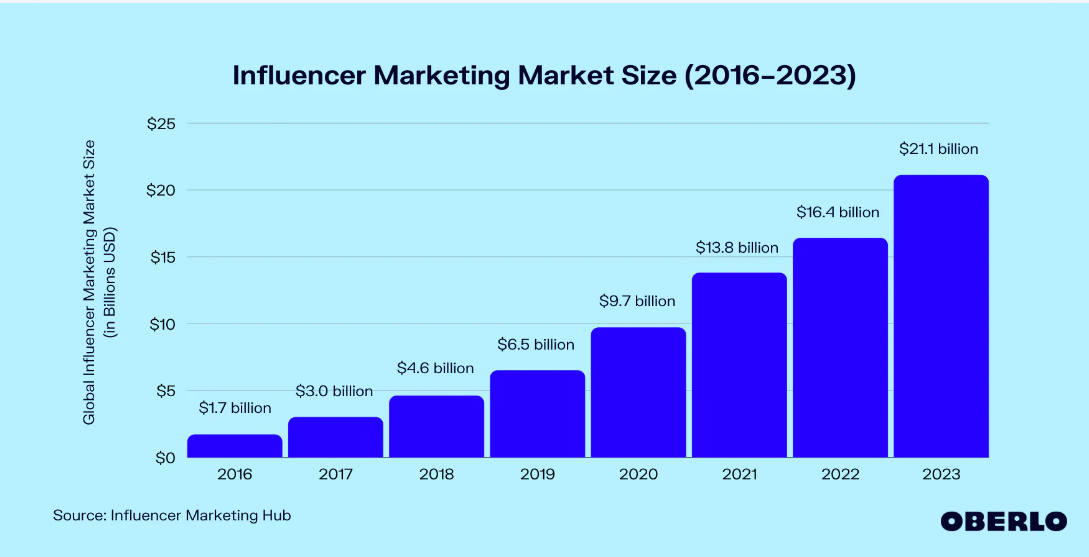Influencer marketing has blown up big time! Partnering with internet stars is now a billion-dollar biz. This social media wave keeps swelling – forecasts say it’ll be a $143 billion monster by 2030! With great clout comes civic duty, right? You’d think all these influential icons would wield their star power for good causes and giving back. Influencers and brands must maintain marketing ethics as they engage in these partnerships.
But when fame meets fortune, higher ideals often take a backseat. Collaboration between brands and influencers is about profits first and social impact second. This web of promotion requires careful navigation. Influencers must consider their content’s effects on impressionable fans. That’s why examining marketing ethics in influencer promotions is crucial.
The most mutually beneficial deals happen when ethics align. Brands can enable influencers to motivate and inspire their audiences. Influencers can authentically connect brands with communities. But cash can’t be the sole motivator. Influencers owe their success to their loyal followers. Promotions should empower fans, not take advantage of them.

If you’re new to influencer marketing, you need to know it requires transparency, authenticity, and honesty from both brands and influencers. Key ethical practices include disclosing sponsorships, providing genuine recommendations, and accurately reporting results. Following core values like these is crucial as influencer marketing continues expanding exponentially. This aligns with the overall concept of business ethics – being transparent, avoiding deception, and providing value to consumers.
The Power of Influencers Over Buying Decisions
The Booming Influencer Marketing Industry
Influencer marketing has exploded in popularity and profitability. Brands are pairing up with social media influencers to advertise products.
Why Influencer Marketing Works
When done right, influencer endorsements feel like trusted recommendations from friends. This makes them more effective than traditional advertisements. Influencers have a genuine connection with their audience. Fans trust their opinions.
Influencer content feels relatable. It’s like getting advice from a friend versus an impersonal ad. Followers emulate influencers’ tastes and preferences. If an influencer likes something, their fans want it, too. However, influencers must consider marketing ethics and make sure their endorsements are authentic and transparent.
Key Influencer Marketing Statistics
- According to the study, 49% of consumers rely on influencer opinions for purchases.
- 40% have bought something after seeing an influencer endorse it.
- Influencer marketing delivers 11X higher ROI than traditional methods.
The Strategic Value for Brands
Partnering with relevant influencers allows brands to:
- Reach wider audiences organically. Influencers have established followership.
- Drive engagement and sales through trusted recommendations.
- Get more authentic endorsements than possible with ads.
- Amplify brand awareness and connect with target demographics.
Best Practices for Influencer Marketing
To maximize results, brands should:
- Vet influencers carefully to ensure a good fit and engaged following.
- Establish clear expectations and metrics for success upfront.
- Encourage influencers to showcase brands in their unique style.
- Develop long-term partnerships for continual branding and sales.
- Compensate influencers fairly for their content and promotion.
How To Balance Business and Transparency

Brands must closely monitor for unethical influencer marketing practices and implement strategies to avoid them. However, the onus is not solely on influencers. Brands must also examine their conduct to ensure they are not employing unscrupulous tactics without realizing it. Partnering with a reputable influencer marketing agency in India can help brands navigate this landscape ethically and effectively.
Common problematic brand behaviors include exerting excessive control over influencers’ messaging and repurposing influencer content without consent. Brands may compromise influencers’ authenticity by forcing them to be mouthpieces for corporate messaging. They may also exploit influencers’ creative work by reusing it inappropriately. These behaviors highlight some key ethical issues in marketing that can arise from brand-influencer partnerships.
Additionally, some self-proclaimed “influencers” unethically inflate their following with fake accounts. Despite having no genuine influence, they collect payments from brands unaware of the deception. To avoid these pitfalls, brands should vet potential partners to confirm their legitimate following.
And they must obtain explicit permission before reposting influencer content. Following ethical best practices benefits brands, influencers, and audiences by fostering collaborations built on trust and transparency. Examining marketing ethics helps ensure influencer promotions are authentic, transparent, and considered carefully for their impact.
1. Collaborate With Real Influencers
For Indian brands looking to build trust through influencer marketing, it is crucial to partner with creators who genuinely connect with your target consumers. When reviewing potential influencer collaborators, look beyond vanity metrics like followers and views alone.
Choose influencers who demonstrate expertise on relevant topics and have an authentic voice. Prioritize those who thoughtfully engage their audience rather than take a sensationalist approach. Seek creators who adhere to ethics and transparency standards even with a modest following size.
Collaborating with nano or micro-influencers with strong bonds with their niche audiences can be more fruitful than broad partnerships. Even if their follower count is low, their ability to convert and drive word-of-mouth for brands is immense. Partnering with nano and micro-influencers with an authentic voice and connection with their audience aligns well with marketing ethics and building trust.
2. Create a Long-term Partnership
Once a brand has identified a group of authentic, impactful influencers who are a good match, cultivating an ongoing partnership is key. Even when paid for branded content, genuine influencers provide honest opinions and transparency. Their adherence to marketing ethics guidelines earns the audience’s trust over time. After shortlisting potential partners, thorough vetting is essential.
Closely examine their feed for properly disclosed sponsored content. By repeatedly collaborating with the same influencers, brands convey valuing long-term success over one-off promotions. Ongoing partnerships allow influencers to become true advocates who understand the brand’s ethos. Audiences notice when an alliance is substantive rather than transactional.
Influencers should be treated as trusted partners, not disposable vendors. Seek their input on campaign ideas and creative direction. Compensate them fairly for their work and time. With a mutually beneficial relationship, their content will never feel forced or inauthentic.
3. Retain a Legal Disclosure Policy in Your Media Kit

For brands employing influencer marketing, having a formal contractual agreement is crucial to ensure marketing ethics compliance. Even if the brand strives for transparency, the onus falls on influencers to properly disclosing sponsorships. A binding document safeguards the brand if issues arise.
The contract should contain disclosure and branding guidelines per Indian marketing laws. This includes mandates like clearly labeling #ad or sponsored at the beginning of posts. Detailed directions for different platforms can be provided.
Legal language around content approval, usage rights, compensation, and consequences for non-compliance gives the brand recourse if influencers fail to follow guidelines. Penalty provisions may be included as deterrents. However, the goal should be educating influencers on Indian disclosure norms versus heavy-handed enforcement. Maintain an open channel for discussing best practices and expectations.
Laying out formal rules sets the foundation for ethical influencer marketing. But cultivating strong, collaborative relationships is equally important. With trust and transparency, both parties can create campaigns that resonate with your targetted consumers.
4. Work With Authentic Influencers
Collaborating with genuinely authentic influencers is key for brands to uphold ethical practices. Credible influencers provide honest insights and transparency about paid partnerships, earning audience trust. Their content adheres to disclosure guidelines without appearing biased. By partnering with ethical influencers and prioritizing marketing ethics, brands can ensure their campaigns are honest and transparent and build audience trust.
Ensuring Compliance Through Vetting
- Manually review potential influencers’ feeds to assess authenticity
- Look for sponsored posts and check for:
- Clear disclosures according to platform guidelines
- The balance between promotion and honest opinions/potential negatives
- High-quality, consistent content overall, indicating genuine passion
Choosing the Right Influencers
- Prioritize creators who focus on a specific niche rather than jumping on trends
- Select influencers with an established record of transparency about partnerships
- Avoid those who heavily curate feedback or turn off comments to escape scrutiny
- Watch for warning signs:
- Drastic changes in content style
- Overly effusive praise for brands
- Engagement that seems fake or bot-driven
Building Strong Relationships
- Treat influencers as true partners, not just contractors
- Maintain open communication about expectations and best practices
- Compensate fairly for time and creative effort
- Develop long-term partnerships for optimal authenticity
- Collaborate on campaign ideas to allow creative freedom
Enforcing Standards
- Include disclosure and ethics rules in a formal contract
- Educate on FTC guidelines and local disclosure norms
- Provide messaging guides tailored for each platform
- Outline usage rights and approval processes
- Define consequences for non-compliance like content removal or withheld payment
Monitoring Ongoing Compliance
- Periodically audit influencer content for proper disclosures
- Follow up if issues are found and give feedback/guidance
- For repeat offenders, enact pre-defined penalties
- Regularly reinforce expectations through open communication
5. The Risks of Excessive Control

A common misstep brands make is exerting excessive control in influencer partnerships in ways that diminish authenticity. For example, dictating pre-written captions that do not align with the influencer’s natural voice comes across as forced and inauthentic to audiences.
Likewise, heavily controlling the direction of content creation overrides the creative instincts of the influencer. Followers are adept at noticing when their favorite influencers seem to become mere corporate mouthpieces rather than staying true to their essence.
While not necessarily unethical, this overly controlling brand approach can erode the audience’s trust and engagement over time. Even if not outright deceptive, excessive creative control makes partnerships feel transactional and manufactured rather than organic and authentic. This highlights some of the ethical issues in marketing that arise when brands try to manage influencer collaborations tightly.
Granting Creative Freedom
- Brands should guide goals and values but avoid micromanaging influencer content.
- Influencers became popular because of their unique personality and style. This essence should be nurtured, not stifled.
- Trust influencers to connect with audiences in an organic, resonant way. They are the experts brands partner with for a reason.
Finding the Right Balance
- Oversight of partnerships is reasonable, but brands must also empower influencer creativity.
- The most successful collaborations allow room for interpretation and originality.
- With transparency and mutual understanding, impactful storytelling upholds both party’s results.
The Bottom Line
At its core, authentic and high-quality content builds influencer trust and success. Beyond ethical considerations, adhering to platform policies is crucial for brands and influencers. By internalizing established regulations and best practices, marketers can avoid potential legal issues or damage to their reputations.
With ethics aligned to strategy, profits and purpose can complement rather than compete. Conscientious brands can leverage influencers to forge meaningful connections, maintain integrity, and amplify reach when they approach partnerships with respect and shared values top of mind. By making marketing ethics a priority and carefully vetting potential partners, brands can find influencers who authentically share their mission and values.
FAQs
How should brands evaluate potential influencer partners?
Brands should thoroughly vet influencers before partnering to ensure they consistently create quality content that aligns with the brand’s messaging and values. Look beyond vanity metrics and ensure the influencer has an authentic voice and engaged community in the target demographic.
What disclosure standards should brands require from influencers?
Brands should provide clear guidelines for influencers on properly disclosing paid partnerships across all platforms. Be specific on expectations – for example, disclosures should be unambiguous, placed at the top of posts, and use terms like #ad or sponsored. Reference FTC endorsement guidelines as well as platform-specific rules. Ensure influencers understand the legal need for transparency.
How can brands support influencers in creating authentic branded content?
Give influencers creative freedom to ensure their content voice shines through. Don’t require rigid scripting or talking points. Build in time for influencers to get familiar with products and identify organic tie-ins to their niche. Make access to products and information easy. Welcome influencer input on campaign themes and deliverables.
What ethical considerations should guide compensation?
To avoid exploitation, brands must compensate fairly at industry standard rates for the influencer’s reach and efforts. Tier pricing appropriately for nano vs. mega influencers. Clarify expectations up front and don’t expect influencers to only produce branded material. Structure payments to reward great work rather than base solely on KPIs.





